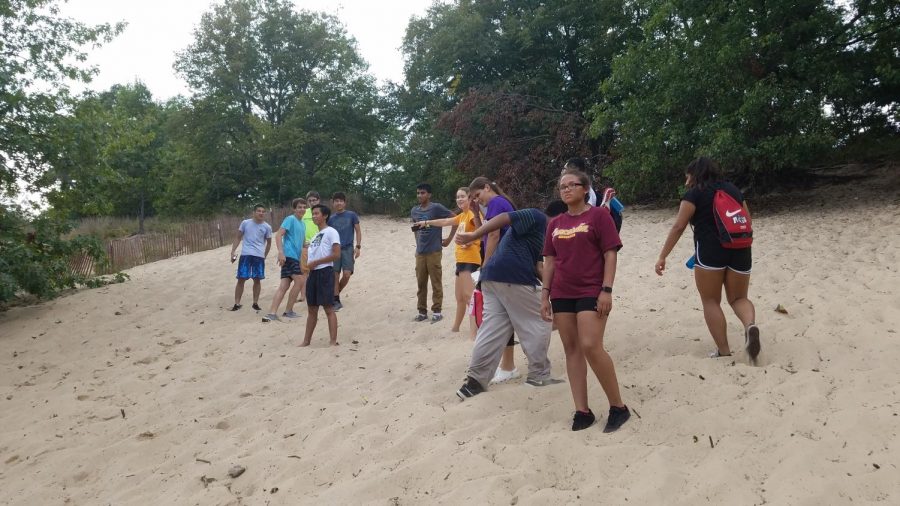Sun and Sand at the Dunes: APES and AP Biology Field Trip
Sep 26, 2018
The AP Environmental Science and AP Biology classes at Niles West took a field trip last week Thursday to the Indiana Dunes State Park to study biodiversity and ecological succession outside of the traditional class room setting.
According to AP Environmental Science teacher Susan Schram, the goal of the field trip is to expose students to topics discussed in class in the real world, such as demonstrating how primary succession, which is a form of changing an ecosystem, plays out at the Indiana Dunes.
“The Indiana Dunes is a national lake shore, and there is one one particular area where we can study where primary succession has occurred in real time,” Schram said. “It is kind of a far drive to go, it’s a mile trail, but I still think it went pretty well. Obviously the kids enjoyed the beach as the first stage of primary succession, it’s one of the few rare areas where you can see how succession occurs.”
For many students, visiting the dunes was a great way to get in touch with the different aspects of nature, whether it be the lake shore beach or juxtaposing forests.
“I thought it was a very enjoyable field trip, and it was a good opportunity to get field experience based on what we’re learning on class,” senior Umar Ahmed said. “My favorite part was getting to the midway point of the trail. The scenery was absolutely gorgeous and it was really interesting getting to see the various different plants and species we had learned about in APES, especially since the Dunes environment is so unique.
One of the main goals of the field trip was to research biodiversity, and how ecological succession has impacted it.
“We started at the beach and gathered data about the different species that were living in the area, from the beach all the way to the wooded dunes area,” senior Hana Frisch said. “It was about a 45 minute hike, and we would stop and measure the biodiversity and the go on, because the Indiana Dunes provides a really great example of ecological succession, which is how ecosystems form, from going from nothing to something like a forest.”
However, the field trip also happened to occur on a day of record breaking heat. Unfortunately that heat also brought down a swarm of mosquitoes on the students.
“The weather itself wasn’t the worst it could’ve been, but it definitely was far from pleasant,” Ahmed said. “It was unbelievably humid and there were a lot of mosquitoes going around and biting people. As the humidity decreased it still remained rather hot.”
To beat the heat, some students decided to take a plunge into Lake Michigan: a decision those students don’t regret.
“To pass time I decided the most logical thing to do was to bury myself in sand,” Ahmed said. “Once I got bored with that and came out it was still very hot, so I decided to do what any reasonable person trying to cool down would do. I walked into the lake fully clothed, cooling off immediately, and remained wet for a chill ride back to Niles West.”
After a long, sandy ride back to Niles West, many of the students were happy to go home and take a nap, or for the more unfortunate ones sports practice after school. Regardless, the students were able to get out of the classroom and a dive into nature, all while having fun and educational experience.




